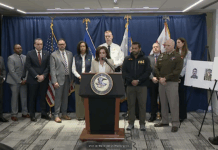
Critics of a Georgia Senate bill that ratchets up penalties for crimes committed during protests say it tramples First Amendment rights and could encourage violence against protesters.
Sen. Randy Robertson, on the other hand, said his legislation provides stronger legal recourse if a group of people break the law by blocking streets and highways, destroying monuments and businesses, or by harming another person.
But civil rights organizations and Democrats say the legislation intends to stop people from participating in protests like the racial and social justice rallies that occurred last year in Atlanta and many other cities in Georgia and across the country.
Robertson’s bill is one of several filed so far this year meant to support the side of law enforcement after 2020’s demonstrations for social justice in Georgia sometimes deteriorated into vandalism and violence. Other 2021 legislative proposals in response to last year’s unrest would ban local governments from cutting police department budgets and require driver’s education instructors to teach students about how to interact with police officers during traffic stops.
The Senate Judiciary Committee could vote as soon as Wednesday on the Cataula Republican’s bill that makes it a felony if seven or more people knowingly participate in a protest while violence or property destruction occurs.
The legislation also makes it a felony to block a highway, punishable with a sentence of one to five years in prison and up to a $5,000 fine. And a person can face racketeering charges if a crime is committed while they are in a group.
While most of the recent protests have been peaceful, Robertson said his goal is to address incidents like the late spring protest in downtown Atlanta that deteriorated into a night of rioting.
“I contend that a significant governmental interest is not only the protection of the citizens that live in the community where the assembly is held but also to every single business owner and private property owner within that city too,” Robertson said at Tuesday’s committee hearing.
“Knowing that I felt that it was necessary after witnessing things that occurred in Seattle, Portland, Atlanta, and recently in our own (U.S.) Capitol that maybe it was time that we looked at and redefined what peaceful assemblies were and redefined what non-peaceful assemblies were.”
Christopher Bruce, political director for ACLU Georgia, says Robertson’s measure not only makes it less likely that people will want to peacefully protest but also unfairly punishes local governments who attempt to reign in overzealous police.
Robertson proposes that a local government can be sued for property damage and injuries if local leaders tell police not to intervene with protesters, as happened last year when an Atlanta elected official asked police to standby after an officer shot Rayshard Brooks last summer.
Also, the state could withhold funding if local police or sheriff’s office budgets are cut by 30%.
“SB 171 seeks to scare individuals away from exercising their First Amendment rights by implementing a broad and vague definition of unlawful assembly,” Bruce said. “Throughout history, we’ve seen people who have suffered the grievous consequences when police are encouraged or permitted to take drastic responses in their interaction with civilians who are exercising their First Amendment rights, especially in the context of civilians protesting for justice and equality.”
Mazie Lynn Causey, a legislative advocate for the Georgia Association of Criminal Defense Attorneys, said she is worried that the bill’s language could encourage people to violently target protesters by providing them immunity. That could lead to situations where a motorist escapes prosecution if they run over someone protesting in the street, she said.
Causey said there are already laws that address the crimes covered in Robertson’s bill without going as far as he proposes.
“I would let you know that in Georgia, you can actually steal a monument, and you’re only subject to three years of possible incarceration,” she said. “This bill would have you serving up to 15 years, merely for defacing it.”






